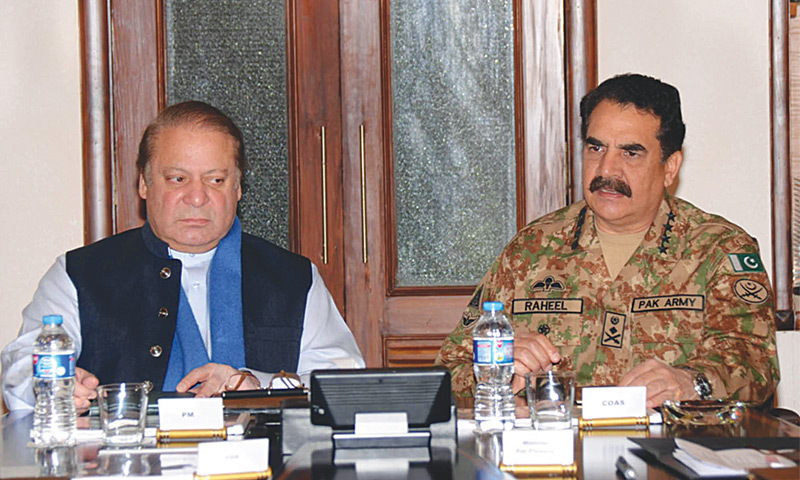PHOTO: Prime Minister Nawaz Sharif with the soon-departing head of the Pakistani Army, General Raheel Sharif
Umer Karim of the University of Birmingham writes for EA:
“When you can move more than half a million men with the movement of your pinky – that is when you can boast of being powerful”. Those words from the former head of Pakistan’s army, General Asif Nawaz Janjua, acknowledge the massive authority of a military chief. With Pakistan’s history of coups and military governments, the armed forces are the most influential and powerful state institution.
Now that institution is undergoing a change in command. General Raheel Sharif is embarking upon farewell tours of different garrisons and core headquarters. The term of the other four-star general, the Chairman of the Joint Chiefs of Staff Committee Rashid Mehmood, is also ending.
Prime Minister Nawaz Sharif has always had a bumpy relationship with the person in charge of the military. In October 1999, his government was sacked by General Pervez Musharaf, then army chief. The outcome was a miscalculation by Sharif, who had promoted Musharaf over others in the belief that he could be “tamed”.
What will happen this time? The Sharif Government has kept the cards close to its chest, with silence even though Raheel Sharif is stepping down on November 29.
There are four senior Lieutenant Generals in the running for the top post. The most senior is the Chief of General Staff, Lt. General Zubair Hayat, with a lustrous career including corps command as well as leadership of the Strategic Plans Division where he worked closely with the Prime Minister’s office.
The next in line is Lt. General Ishfaq Nadeem Kayani, who has commanded the recent military operations in North Waziristan against the insurgents of Tehrik-i-Taliban Pakistan. The general has previous been Director General of Military Operations and Chief of General Staff. He is believed to be close to Raheel Sharif.
Next is Lt. General Javed Iqbal Ramday, currently the corps commander of Bahawalpur. He commanded operations in Swat Province against TTP and was injured when sniper fire hit his helicopter. He has also served as President of National Defence University. He is related to a former judge of the Supreme Court, Justice Khalil Ramday, who is considered a close associate of the Prime Minister, and other family relatives of his are affiliated with Nawaz Sharif’s party.
The fourth in line is Lt. General Qamar Bajwa. He has commanded the important X Corps on the Kashmir front. However, he is currently Inspector General for training and evaluation, far from the most illustrious post in the military.
The silence of the Prime Minister has complicated matters, indicating that he might not be going with the role of seniority. Indeed, it is likely that Nawaz Sharif will be longing to choose someone whom he knows well and — given the Musharraf episode — whom he believes to be beyond a turn against him.
That political calculation adds intrigue and uncertainty to the matter of who “can move more than half a million men with the movement of his pinky”.

